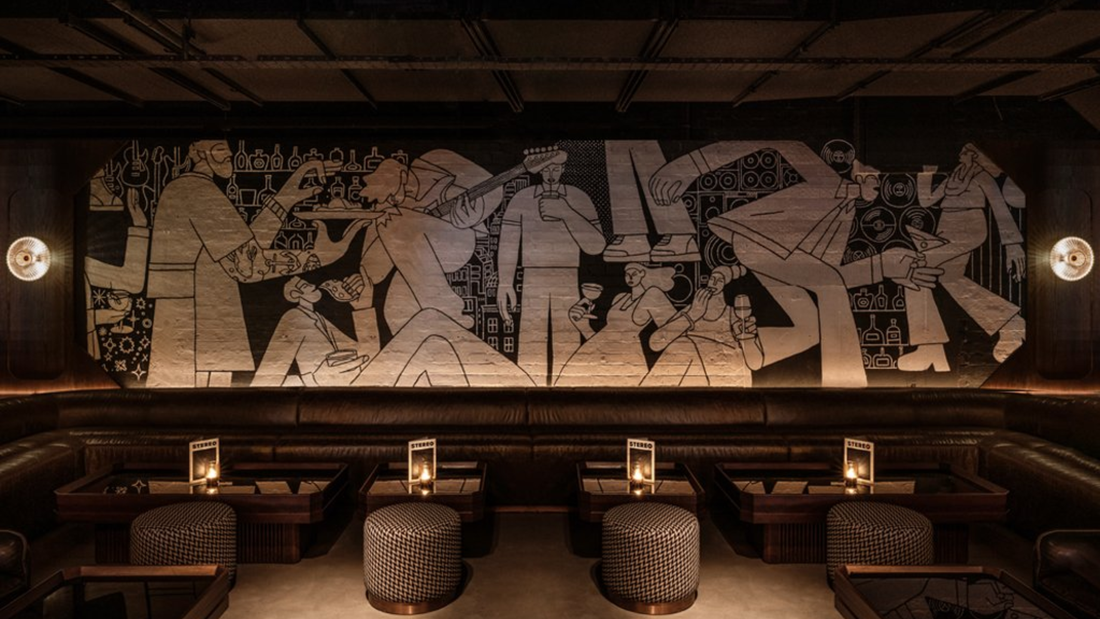
STEREO — London’s Subterranean Frequency
By Rafi Mercer
New Listing
Venue Name: STEREO
Address: 35 The Piazza, Covent Garden, London WC2E 8BE, United Kingdom.
Website: stereocoventgarden.com
Instagram: @stereocoventgarden
The descent is deliberate. Down the steps from Covent Garden’s glittering piazza, the noise of the city fades — replaced by something heavier, warmer, and infinitely more deliberate. STEREO is not the sort of bar that announces itself. It waits, subterranean and cinematic, its presence felt before it’s seen.
The door opens onto a space of deep colour and low geometry: curved banquettes in oxblood leather, mirrored columns, light that glows like honey over marble and brass. It feels like the set of a 1970s film, equal parts Parisian cabaret and New York supper club, but filtered through London’s current obsession with sound and spectacle. The room breathes in rhythm. Behind the velvet curtains, the stage hums with the quiet electricity of instruments waiting to wake.
This is STEREO, the latest creation from the Experimental Group — the people behind London’s Henrietta Hotel and Paris’s Prescription Cocktail Club. Their ambition here was to fuse the architecture of a live music venue with the poise of a cocktail lounge. Beneath the tourist bustle of Covent Garden, they’ve built a room where everything — sightlines, surfaces, speakers — converges toward the stage. Sound is the structure.
Installed across the venue is a custom L-Acoustics sound system, engineered to give the live room the texture of a studio and the intimacy of a listening bar. On quiet nights, the clarity feels forensic: you can hear the space between notes, the air behind a voice. When the energy builds — funk, jazz, or deep house on vinyl — the system holds its composure, carrying bass clean and whole without distortion. It’s the kind of sound that makes you look up from your glass without knowing why.
Programming shifts with the night. Early evenings are often live — small bands, soul trios, global jazz collectives — while later hours hand over to selectors and DJs who keep the energy measured but magnetic. The music moves through time zones rather than genres: Brazilian funk one hour, Parisian disco the next, then a dive into Detroit’s deeper frequencies. It’s cosmopolitan in the truest sense, curated for the curious rather than the algorithmic.
At the bar, theatre meets precision. Cocktails are built like choreography — swift, assured, quietly dramatic. Expect house infusions, vintage spirits, and subtle references to London’s golden age of nightlife. Their Negroni Noir, made with cacao nib gin and bitters aged in oak, has become something of a signature. Wine lovers are equally well served, with more than a hundred bottles spanning natural producers and established estates. Local partnerships add personality: beers from Partizan Brewery, house spirits from Thames Distillers. Every drink seems to hum in tune with the room’s frequency.
The kitchen brings its own rhythm. The menu is classic American comfort — fried chicken sandwiches, lobster rolls, mac and cheese, late-night burgers — rendered with European restraint. It’s food designed for atmosphere: familiar enough to relax into, indulgent enough to justify staying past midnight. Service is quietly polished, the team fluent in both mixology and music, capable of explaining a sound check or a bottle of Burgundy with equal confidence.
By midnight, the energy changes. The stage lights dim, the DJ steps up, and the bar’s name begins to make sense. STEREO isn’t about nostalgia; it’s about presence — that moment when sound, light, and architecture align. You can feel it in the air: a low-end hum under your feet, a reflection glancing off the mirrored wall, a glass raised in rhythm. London has plenty of basement bars, but few that manage to make the descent feel like transformation.
When you finally climb back to street level, the air of Covent Garden feels thinner, sharper. The city noise rushes in, and you realise how still it had been down there. STEREO lingers — not as a memory of a song, but as an afterimage of sound itself. It’s what every great bar should be: a portal, a pause, a perfect measure of escape.
Rafi Mercer writes about the spaces where music matters. For more stories from Tracks & Tales, subscribe, or click here to read more.














